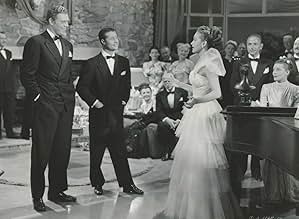It begins like Detlef Sierck's "das Hofkonzert.";in both movies ,the star is no longer available and they need a replacement ;music and dance make almost 50% of the movie in both although the German one was operetta .There the comparison ends.
It's a carnival dancer ,a would be folies bergères ex-artist who will play the part ; then the script turns Bernard Shaw's "Pygmalion" : her manners are not adequate , her grammar is worse ,so he asks a teacher to use phonetics to make a duchess out of the Flower Girl. Dancing ,singing and glamour are no problem for Miss Lamour , who even tries to live up to her so called reputation by learning a little bit of French (one can hear her utter "n'est-ce pas? " (in French,there's no problem with don't it ?and doesn't it ?,for it translates everything) ,"bonjour monsieur" ;hence the title .
But wouldn't Mary O'Leary lose her whole identity in the process when she became Rochelle Olivia ? And eventually won't his creator(Don amèche) be caught out at his own game ?
As it often happens in Douglas Sirk's imitation of life, reality and performances (the row between the director and his star) are difficult to distinguish;in his book , "exquisite ironies and magnificent obsessions ", Tom Ryan points out that his happy endings are often ironical and double-entendre.





























